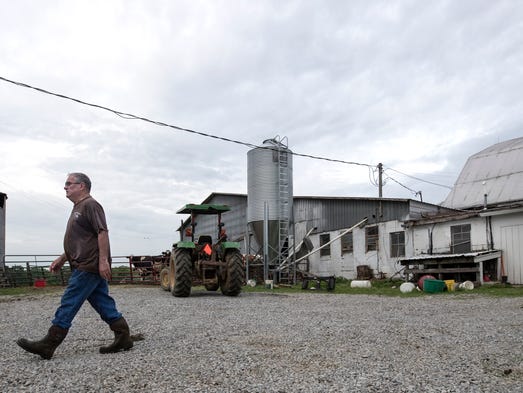
If they can’t find a processor to buy the milk produced twice a day by their remaining 42 Holsteins, they face dumping the milk and flushing away a 69-year-old family dairy.
And if Warren Cheek had his way, he’d pass away before his herd beat him to the graveyard. “I always say, ‘I just hope to milk some morning and die’ … (but) this could put us out of business.”
The Cheeks and 18 other dairy farmers in Kentucky were among more than 100 in Indiana, Pennsylvania, Tennessee and three other states who received certified letters from Dean Foods in late February informing them that their milk procurement contracts would be terminated by May 31.
Farmers got a brief reprieve this week when Dean extended the deadline until the end of June.
The reason for the cut: Walmart no longer will buy Dean’s milk for its Great Value house brand, cutting the production needed at Dean’s Louisville plant, which the company announced will be shut down soon. Walmart has started its own production facility in Fort Wayne, Indiana.
That new competitor plant paired with a steady increase in milk production when milk consumption is declining is unsustainable, Dean’s Brent Bunce wrote in the letter.
The letters set off a frantic search for other cooperatives to step in and help local farmers. In Kentucky and parts of Southern Indiana, farmers have had little luck getting Dairy Farmers of America or another cooperative to pick up their contracts, said Maury Cox, executive director of the Kentucky Dairy Development Council.
But since that price surge, exports have leveled off and alternatives, like almond, cashew, coconut and soy — “nut juices,” not milk, Cox said — have grabbed market share.
The prospect of losing Dean’s twice monthly milk check has already forced five of the 19 impacted Kentucky dairy farms to sell out. Kentucky had 562 permitted dairy farms when the letters went out in February, which makes less than two dozen impacted farms sound like a meager share – until you calculate that each cow generates $14,000 a year economic impact from vet bills, feed, fuel and equipment, Cox said.
With average herds of 92 cows, that’s nearly $1.3 million for each farming operation.
Many farmers have begun to sell their herds, including the Cheeks, who thinned theirs for a fraction of their livestock’s original cost. They cling to hope that Select Milk Producers, a cooperative that supplies milk to Kroger, might pick them up.
“We’re down to the ‘is-a-miracle-going-to-happen’ stage,” Donna Cheek said. “We haven’t gotten a ‘yes’ yet.”
In Nelson County, there are just five dairy farms left and three linked to Dean, the Cheeks and nearby farms run by twin brothers Bobby and Billy Lutz.
Two family-run operations with Dean contracts in Henry County are working on survival plans, including Carilynn and Curtis Coombs, both 30, who’d dreamed of selling their part of a large dairy to their kids, ages 1 and 3. They started in the business after graduating from University of Kentucky seven years ago.
Now, they’re considering an ice cream business or a subscription-based CSA (community-supported agriculture) where they bottle and supply milk directly to buyers in Prospect and other Louisville outer suburbs willing to pay the price.
Converting to a value-added business takes cash for equipment, and banks are hesitant to get behind dairy anything, especially for something their size, Carilynn Coombs said.
The 450-acre farm supports the younger Coombses, plus Curtis’ father and uncle. When eight cows were loaded up and taken away for sale this month, Coombs said, it felt like too much. “I never saw my husband cry so hard.”
Kroger spokeswoman Erin Grant said that discussions are continuing with Select, but the grocery giant hasn’t settled on its next steps. “We know how important it is to our local farmers,” Grant said. “It just breaks your heart that some people” may be put out of business.
Donna Cheek, 68, said they dread the day they may look out the kitchen window and not see their cows. They’re as much family as their four kids.
“They talk about the American Dream, farm to table, Kentucky Proud. It’s just not happening here.”
Source: Courier Journal











